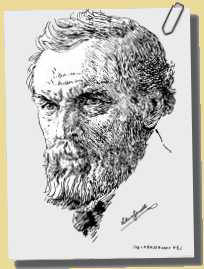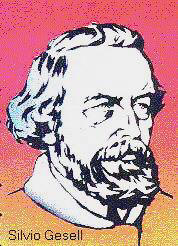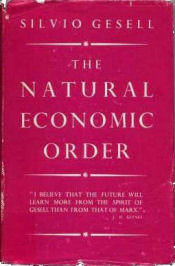Biografy
Silvio Gesell
(1862-1930)
 Silvio
Gesell was born at St. Vith on the German-Luxembourg frontier of a German father
and a French mother. In 1886 he migrated to Argentina, prospered as importer and
manufacturer, and became interested in the currency question during the world
depression of 1873-96. In his first work, "Currency Reform as Bridge to
the Social State" (1891), Gesell made the celebrated proposal for
unhoardable money. Further studies on the disastrous effects of deflation and
the necessity for stabilizing the purchasing power of money followed. Retiring
to Switzerland, Gesell brought out a periodical for currency and land reform and
in 1906 wrote his main book, The
Natural Economic Order.
Silvio
Gesell was born at St. Vith on the German-Luxembourg frontier of a German father
and a French mother. In 1886 he migrated to Argentina, prospered as importer and
manufacturer, and became interested in the currency question during the world
depression of 1873-96. In his first work, "Currency Reform as Bridge to
the Social State" (1891), Gesell made the celebrated proposal for
unhoardable money. Further studies on the disastrous effects of deflation and
the necessity for stabilizing the purchasing power of money followed. Retiring
to Switzerland, Gesell brought out a periodical for currency and land reform and
in 1906 wrote his main book, The
Natural Economic Order.
In 1919 Gustav Landauer, one of the chief figures of the German Revolution of 1918-19, invited Gesell to become finance minister in the shortlived Bavarian Republic. Both men were arrested and charged with treason. Landauer was murdered in prison; Gesell was acquitted. He continued to publish actively in Berlin where he died in 1930.
The Natural Economic Order
Gesell's celebrated work on monetary and social reform is a modern attempt to provide a solid basis for economic liberalism, the creed of Adam Smith and almost all the great nineteenth century economists in contrast to the twentieth century trend of collectivism and planned economy - accompanied by 'austerity', 'import restriction', 'dollar shortage', 'pegging the exchanges' and 'credit squeeze'. There is now again trend toward economic liberalism: private initiative, free trade and free exchanges. Economic liberalism, believed to have been strongly influenced by Gesell's book, has produced the "West German miracle", the quickest and by far most complete recovery of any country that had been under the bombs.
The book gives the economist, the politician and the businessman clear insight into the mechanism and dangers of inflation and deflation and contains an authorative account of unhoardable money, money that causes its holder carrying costs - a completely original idea important in monetary theory and practice.
Silvio Gesell (1862-1930)
 Silvio
Gesell nacque a St. Vith sulla frontiera tra Germania e Lussemburgo da padre
tedesco e madre francese. Nel 1886 emigrò ad Argentina dove intraprese attività
commerciali e si interesso della situazione valutaria durante la
depressione mondiale del 1873-96. Nel suo primo lavoro, "Riforma della
valuta come ponte allo stato sociale" (1891), Gesell tratto le sue idee
sul denaro. Studiò gli effetti disastrosi della deflazione e la necessità di
stabilizzare il potere di acquisto dei soldi. Andando in pensione in Svizzera,
Gesell scrisse nel 1906 il suo libro principale, Il
Naturale Ordine Economico.
Silvio
Gesell nacque a St. Vith sulla frontiera tra Germania e Lussemburgo da padre
tedesco e madre francese. Nel 1886 emigrò ad Argentina dove intraprese attività
commerciali e si interesso della situazione valutaria durante la
depressione mondiale del 1873-96. Nel suo primo lavoro, "Riforma della
valuta come ponte allo stato sociale" (1891), Gesell tratto le sue idee
sul denaro. Studiò gli effetti disastrosi della deflazione e la necessità di
stabilizzare il potere di acquisto dei soldi. Andando in pensione in Svizzera,
Gesell scrisse nel 1906 il suo libro principale, Il
Naturale Ordine Economico.
Nel 1919 Gustav Landauer, una delle figure principali della Rivoluzione tedesca
del 1918-19, propose a Gesell di diventare ministro delle finanza nella
Repubblica Bavarese. Entrambi gli uomini furono arrestati ed accusati di
tradimento. Landauer fu assassinato in prigione; Gesell fu assolto e continuò
attivamente a pubblicare a Berlino dove morì nel 1930.
Il Naturale Ordine Economico
Il lavoro di Gesell sulla riforma valutaria e sociale è un tentativo moderno di offrire una base solida al liberalismo economico, il credo di Adam Smith e pressoché di tutti il più grandi economisti del diciannovesimo secolo in contrasto al trend del ventesimo secolo dominato da pianificazione economica, austerità, restrizione alle importazioni, scarsità di valute, fissazione dei cambi e riduzione del credito. Il libro dà all'economista, allo statista e all'uomo d'affari indicazioni chiare sul meccanismo e sui pericoli dell'inflazione e della deflazione e contiene la famosa proposta di "demurrage", cioè l'istituzione di un interesse negativo nella tesaurizzazione del denaro. Un'idea originale e importante nella teoria valutaria e nella vita pratica. Keynes nella sua Teoria generale della moneta, scrisse che di lui si sarebbe sentito parlare a lungo in futuro. Nonostante ciò l'opera di Gesell è per lo più sconosciuta e introvabile in libreria. Non sono disponibili edizioni in italiano. L'ultima edizione disponibile in inglese è datata 1929.
